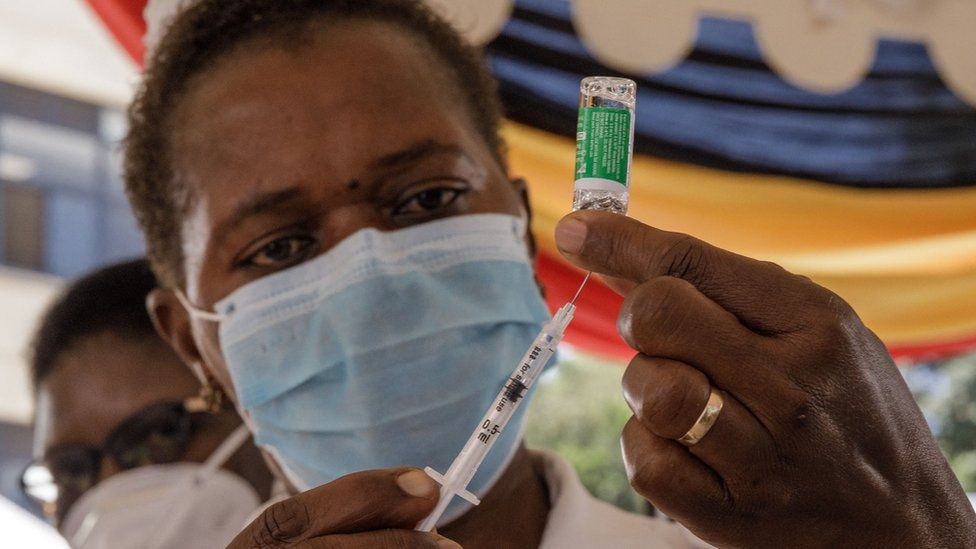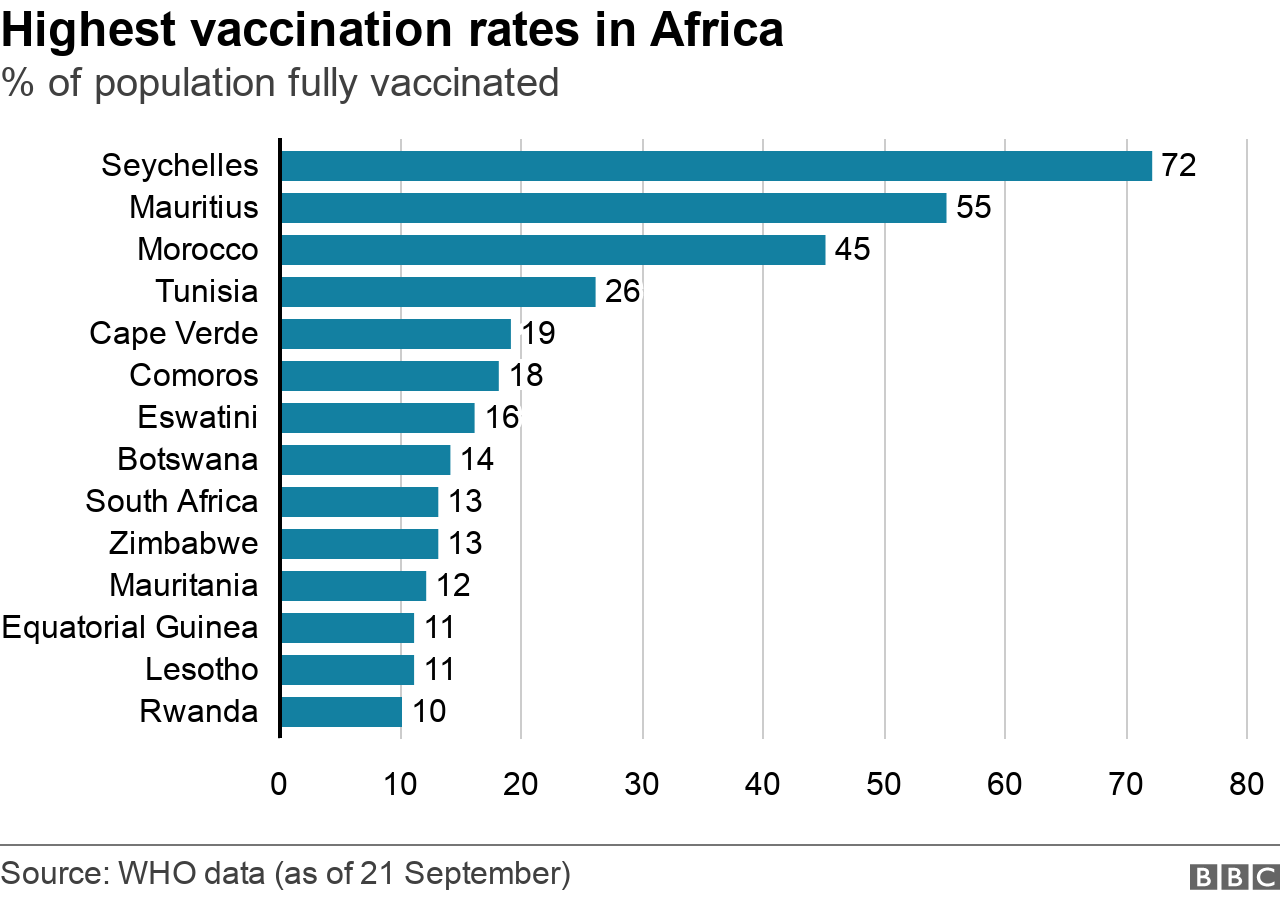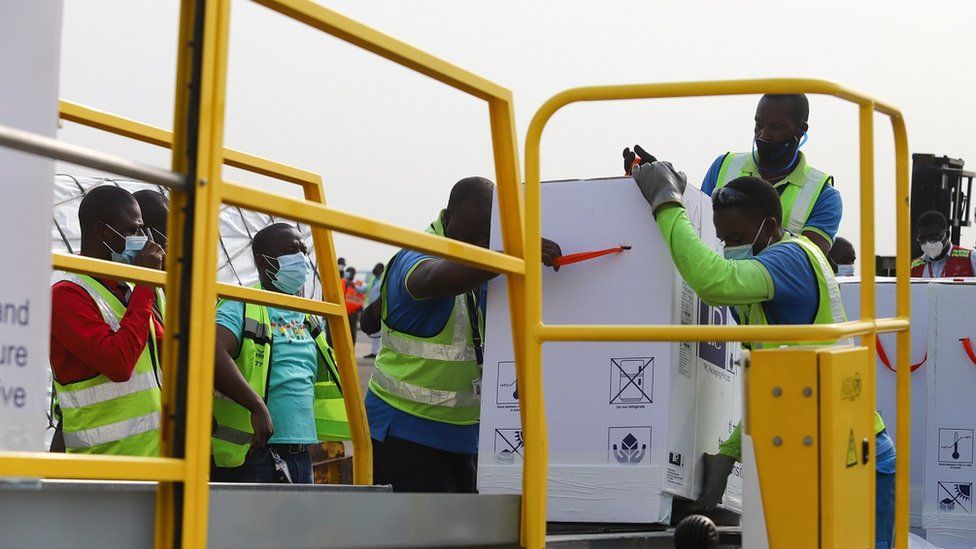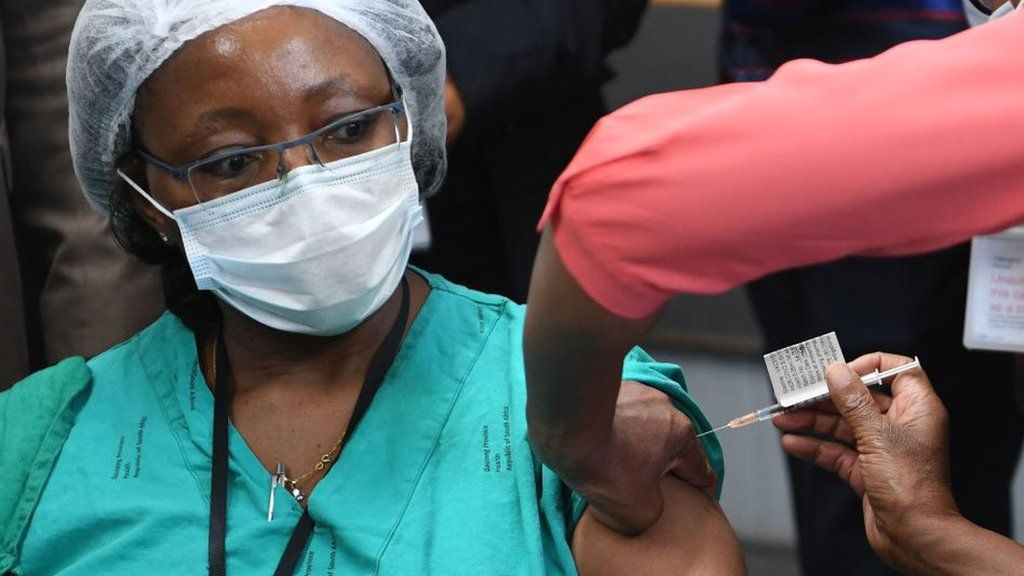Less than 4% of Africa’s population has been fully vaccinated, compared with around 54% in the US and 65% in the UK.
What’s happened to supplies to Africa?
The WHO says African countries have so far received 177 million vaccine doses.
The global Covax vaccine scheme, intended to help poorer countries, has supplied about 37% of these, with the rest acquired through bilateral deals and donations from a variety of sources.
Earlier this year, countries struggled to get supplies via Covax, but the situation improved in July and August.
Supply was partly boosted by wealthier countries donating to Covax – or directly to African nations.
 IMAGE SOURCE,GETTY IMAGES
IMAGE SOURCE,GETTY IMAGESFor example, there were pledges made to share surplus supplies at the G7 summit in the UK last June.
On 2 September, the WHO said that almost 21 million vaccines had arrived in Africa via Covax in the month of August – an amount equal to the previous four months combined.
And African countries are expected to receive about 95 million doses through this scheme in September.
How much vaccine is needed in Africa?
WHO data shows that 14 African countries have so far hit the target of 10% fully vaccinated, but many of the larger countries with the poorest populations are lagging far behind.
“Many of these [more highly vaccinated] countries are in the upper-middle or high-income brackets and have procured vaccines directly from manufacturers,” WHO Africa regional director Matshidiso Moeti says.
The WHO has projected that the continent needs a total of about 270 million vaccine doses to reach the target of 10% fully vaccinated by the end of this month.

Covax aimed to deliver 620 million doses to Africa by the end of 2021, but it now expects to deliver only about 470 million.
That will be enough to vaccinate just 17% of Africa’s population, which is below a global target of vaccinating 40% of the population by the end of the year.
So far, only the Seychelles, Mauritius and Morocco have reached that target.
Close to 500 million extra doses are needed by the end of December for other nations to reach that target – even if all planned shipments via Covax and the African Union are delivered.
“At this rate, the continent may only reach the 40% target by the end of March 2022,” Matshidiso Moeti says.
The former UK Prime Minister Gordon Brown has called on wealthier countries who have surplus doses to urgently agree a plan to shift these stocks to poorer countries, including in Africa.
Recent research looking at vaccine supply in G7 and EU countries says that of the more than 1.2 billion doses pledged to be donated by the middle of 2022, less than 12% has actually been delivered.
What has caused vaccine shortages?
Most African countries initially got their vaccines under the Covax scheme, and these were largely sourced from the Serum Institute of India (SII), the world’s biggest vaccine maker.
However, India halted vaccine exports in response to its own urgent needs, and manufacturers faced issues with ramping up production in a short space of time.
 IMAGE SOURCE,GETTY IMAGES
IMAGE SOURCE,GETTY IMAGESWealthier countries had signed deals with manufacturers for prospective vaccines as early as July 2020 while they were still in development and undergoing trials.
They were given priority by vaccine manufacturers – making it difficult for the Covax scheme, the African Union and individual countries to secure doses.
Earlier this month, a Covax statement on supply forecasts for the rest of this year and early 2022 said it was reducing its estimate of the number of doses it expects to receive because:
- export bans (in particular uncertainty about whether India would resume exports)
- challenges in scaling up production (especially of the Johnson & Johnson and AstraZeneca vaccines)
- delays to regulatory for other vaccines
However, it added that should some of these things change, “major additional doses could become available to Covax in 2021.”
India has announced it will resume some Covid vaccine exports from October.
Some African countries have managed to quickly use up their vaccine supplies, while others have had a slow uptake of jabs.
The slow rate of vaccination is caused partly by issues around distributing the vaccines, such as the lack of health infrastructure, funding for medical supplies used during vaccination and staff.
But there are fears that vaccine hesitancy and scepticism could be playing a role.
 IMAGE SOURCE,GETTY IMAGES
IMAGE SOURCE,GETTY IMAGESThe WHO has called on African nations to push forward with their vaccination programmes, pointing out that 26 countries had used less than half their Covid vaccines.
“Countries must continue to … improve, adapt and refine their… vaccination campaigns.”
It’s also pointed out that although overall case numbers are declining slightly in Africa, in some parts of the continent they are going up.



No comments:
Post a Comment
Note: only a member of this blog may post a comment.